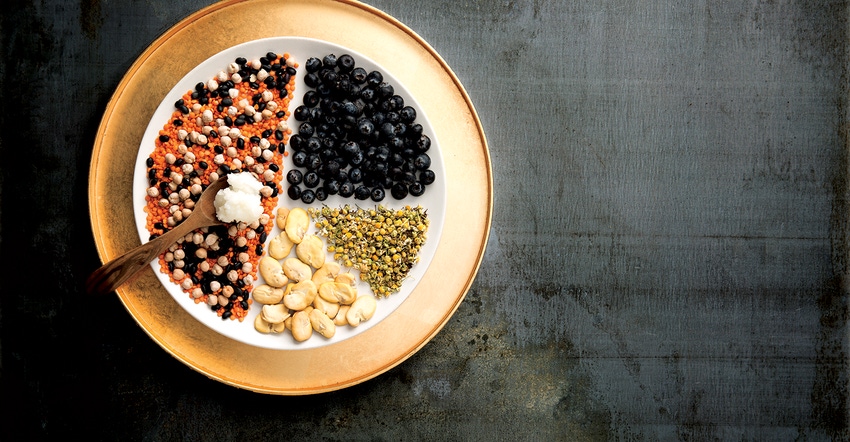
Remember when quinoa was considered an exotic grain? Back in the early 2000s, the tiny pseudo-seed from South America seemed to achieve fame overnight. But delve deeper into the story of quinoa and you’ll find that food writers espoused its health benefits as a complete protein since the ’80s. Later forces, such as Oprah’s well-publicized, quinoa-containing 21-day cleanse in 2008, a proliferation of quinoa recipes on cooking blogs and improved availability in natural and conventional retailers caused quinoa imports into the United States to swell. Quinoa reached critical mass when the Food and Agriculture Organization of the United Nations declared that 2013 was the International Year of Quinoa.
Tracking the rise and fall of food trends such as quinoa is a nuanced task. They’re “often based on not much more than noting what is already percolating in big cities,” journalist Kim Severson recently wrote in the New York Times. While food brands are certainly influenced by the cuisine at notable urban restaurants (for example, many believe kale’s popularity was sparked by the now-closed New York City restaurant Northern Spy Food Co.), the natural products industry is uniquely influenced by a conglomeration of emerging research about health, eating patterns and a rising consumer desire for clean, pronounceable ingredients and transparency in labeling.
While identifying trends is, as Severson relates, “more art than science,” Natural Products Expo West and Natural Products Expo East serve as prime arenas to identify developing ingredient motifs across nearly every food and beverage category. The products below fall within four trends Natural Foods Merchandiser editors pinpointed over the last year, which include a focus on fiber- and protein-dense legumes, products that reflect the evolving view on better-for-you fats, an integration of supplemental collagen into food and a growing movement to ditch food additives—including natural flavors.
Clean label reigns
It’s difficult to track the use of natural flavors in food and beverage products. For one, it’s convoluted to understand what a “natural flavor” even is, as the FDA does not require companies to list every ingredient that natural flavorings may contain.
“The truth is that when you see the word ‘flavor’ on a food label, you have almost no clue what chemicals may have been added to the food under the umbrella of this vague term,” the Environmental Working Group wrote in a blog. This is problematic for the huge subset of shoppers who follow special diets that limit certain foods.
But some brands are publicly rejecting such add-ins because of their murky definition. Fuller Foods, makers of corn-based puffed snacks (think better-for-you Cheetos), is adamantly against the use of natural flavors—or food additives of any kind. “Our sourcing ethics dictate us to use only non-GMO, ‘minimally processed’ ingredients. By this we mean ingredients must be as simple as what you’d use if you were making a pie from scratch at home,” says founder Jack Kuo. “This is in response to the abusive use of ‘natural’ on branding or use of highly processed and modified ingredients such as maltodextrin, colorants, yeast and natural flavors.”
Tim Avila, president of Systems Bioscience, says that though the trend of consumers rejecting natural flavors is still early on, it is driven by the desire for “extreme clean label and transparency.” He also explains, “It satisfies a certain consumer mindset.” But Avila is quick to caution that requiring labeling of every ingredient that comprises “natural flavoring” may lead to a slippery slope of intellectual property infringement (think Colonel Sanders’ secret blend of 11 herbs and spices, or the formula for Coca-Cola). Some brands are finding that the easiest way to ensure truth in labeling is to exclude natural flavoring altogether.
Rising ingredients
Other food and beverage trends, such as mounting inclusion of the functional ingredient collagen in products, are easier to identify due to tangible sales data. According to SPINS, in the natural channel, products that contain collagen grew an incredible 61.3 percent to $10.2 million over the 52 weeks ending April 21, 2017. Collagen growth in the conventional channel was a strong 27.7 percent over the same time period, with sales reaching $28.7 million—nearly three times the amount of the natural category.
Clearly, collagen is a hot ingredient—and growth doesn’t seem to be slowing anytime soon. But what factors are influencing this popularity?
Across food and beverage categories, brands are infusing products with ingredients traditionally found in the supplement category: Therapeutic doses of powdered mushroom are baked into bars and teas; turmeric and probiotics are added to quick-to-consume beverages. Collagen has traditionally been taken as a powder or chew. But now, it’s branching outside the supplement aisle—appealing to typically younger consumers who dislike taking supplements in pill form. Additionally, with their focus on protein and healthy fats, the influence of special diets such as paleo and ketogenic contribute to collagen-containing packaged foods.
“The reason we like to work with collagen in our products is because, although the focus in the ketogenic diet is on stripping out the carbs and eating food high in healthy fats, there is still a moderate protein requirement,” says Tracey King, co-founder of Ketologie, a brand that sits at the intersection of keto and paleo by offering a dry mix containing collagen and medium chain triglyceride (MCT) oil. While whey protein was historically the go-to pick for fitness-minded folks, it doesn’t jive with paleo diet followers, who believe dairy products and lactose should be avoided. “There is an increasing crossover between the paleo and keto worlds. Clearly, collagen fits within the paleo definition of acceptable foods, being derived from the bones and hides of animals,” says King.
Similarly, the popularity of grain-free and gluten-free eating has sparked brands to craft snacks, pasta, condiments and pantry ingredients with healthful legumes (lentils, chickpeas, black beans and even peanuts) rather than nutritionally subpar potato starch, tapioca starch or white rice. Bonus: Even consumers who don’t follow a special diet are still drawn to legume-based products because they offer high protein, lower carbs and fewer ingredients.
Below, find a sampling of the new trends primed to appeal to your shoppers.
Lovely legumes
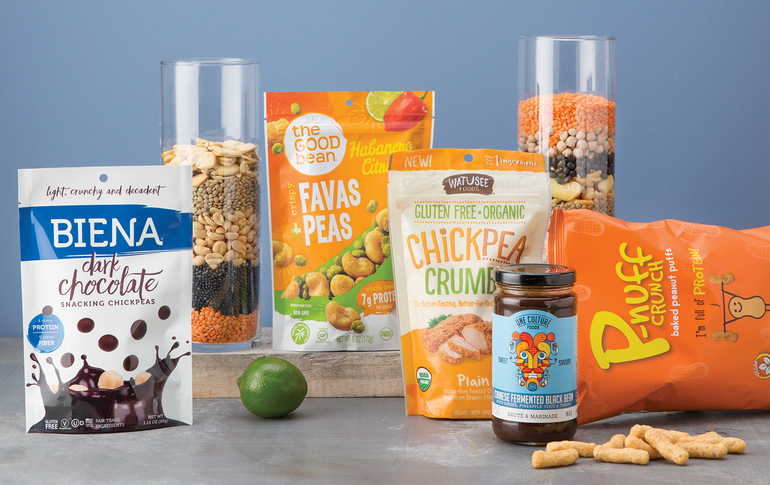
Biena Dark Chocolate Snacking Chickpeas
They’re crunchy. They’re sweet. They’re … chickpeas? Makers of the savory roasted chickpea snacks recently branched into desserts. Each crispy garbanzo bean is coated with a thin layer of fair trade dark chocolate, making a protein- and fiber-dense snack with just 4 grams of sugar per 130-calorie serving. Also available in Milk Chocolate and Salted Caramel flavors. Try sprinkling atop yogurt for added texture. SRP: $4.49
The Good Bean Crispy Favas + Peas Habanero Citrus
Place The Good Bean’s whole-food snacks at checkout and watch them disappear. Health-minded shoppers will adore these hot-tangy-salty snacks made with a base of coconut oil-roasted fava beans and green split peas, and dusted with garlic powder, onion powder, cilantro, habanero pepper and more. The icing on the grab-and-go snack: They contain 7 grams of protein
per serving. SRP: $3.99-$4.29
Watusee Snacks Chickpea Crumbs
For grain-free or gluten-free eaters, chances are that breaded chicken fingers, mozzarella sticks and crab cakes are out of the picture. That’s why customers will be excited about Watusee’s single-ingredient product, Chickpea Crumbs. Made with just organic garbanzo beans, these toasted and pulverized chickpeas provide a perfect crunchy swap for conventional breadcrumbs. Also keep an eye out for Watusee’s soon-to-launch Popped Chickpeatos snack. SRP: $4.99
One Culture Foods Chinese Fermented Black Bean
This cool New York City brand crafts delicious, globally inspired flavors to celebrate “the universal language of food.” This flavorful black bean-based sauce is a sweet-savory addition to fish, vegetables, meat and more. Made with fermented black beans, onion, ginger, cane sugar, pineapple juice, garlic and a big shot of spices, it easily enlivens meals in a jiffy. SRP: $6.99
P-nuff Crunch Baked Peanut Puffs
Each vegan, baked puff lends a burst of intense, peanuty flavor. But contrary to the powerful peanut taste, navy beans actually make up the majority of these unique snacks. Also inside, find rice, peanut oil, brown rice protein and, yes, more peanuts. P-nuff makes a redeeming midafternoon snack with 5 grams of protein and just 2 grams of sugar per serving. SRP: $3.99
Curating ketogenic
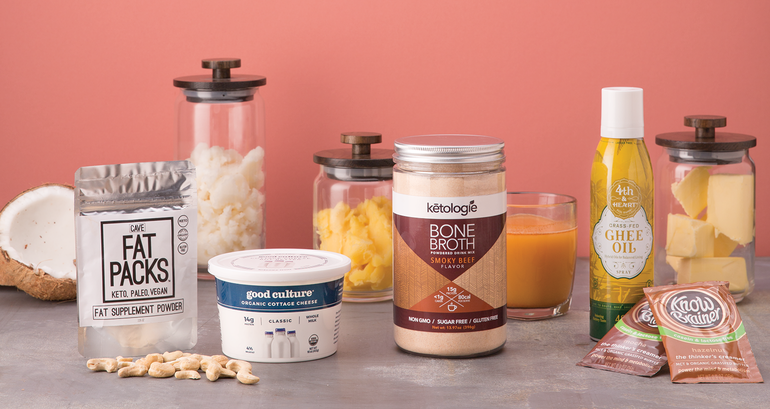
Cave Shake Cave Fat Packs
Developed to make consuming high-quality fats easier, this quirky organic product contains a delicious combination of organic coconut milk powder, organic stevia and organic tapioca maltodextrin derived from organic yuca root—that’s it. It’s a shelf-stable version of Cave Shake’s ready-to-drink beverage. To use, add half the packet to warm water or coffee, stir and sip. Followers of the keto diet will love that each serving contains 18 grams of vegan saturated fat. SRP: $5.99
Good Culture Organic Cottage Cheese Classic 16 Ounce
While Good Culture’s simple, cleaner staple product isn’t overtly marketed to ketogenic consumers, the keto-eating ethos of good fats has heavily influenced brands to embrace whole-milk, full-fat products. Made simply with USDA Organic skim milk, whole milk, cream, Celtic sea salt and live and active cultures, this low-carb snack delivers 4.5 grams of fat per serving and an impressive
14 grams of protein. SRP: $5.49
Ketologie Bone Broth Smoky Beef
CrossFit crowds have been sipping bone broth for years. But recently, natural brands are solving the convenience problem: bone broths are tasty and delicious, but they take a long time to prepare. Ketologie’s new Bone Broth Powdered Mix Drink blends grass-fed beef hydrolyzed collagen, medium chain triglycerides, beef broth and savory garlic, onion and black pepper. Just add hot water for 15 grams of protein per serving. SRP: $34.95
4th & Heart Grass-Fed Ghee Oil Spray
Ghee, also called clarified butter, is a traditional Ayurvedic ingredient lauded for its lack of dairy proteins that can cause digestive distress in some individuals. Inside this beautiful bottle, find high-quality ghee made with grass-fed butter from New Zealand cows. A high smoke point makes ghee perfect for high-heat cooking, such as stir-frying vegetables or searing meats, and the spray packaging makes it particularly suited for modern life. SRP: $8.99
Know Brainer Hazelnut Casein & Lactose Free Creamer
It’s a ketogenic-friendly creamer for consumers on the go. Each throw-it-in-your-bag packet contains non-GMO MCT oil from coconuts, organic pasture-raised ghee, organic coconut milk powder, hazelnut flavor, organic almonds, organic cashews and more. To prepare, just squeeze the 200-calorie mixture into coffee, give it a good stir and enjoy. SRP: $1.59-$1.99
Collagen and food collide
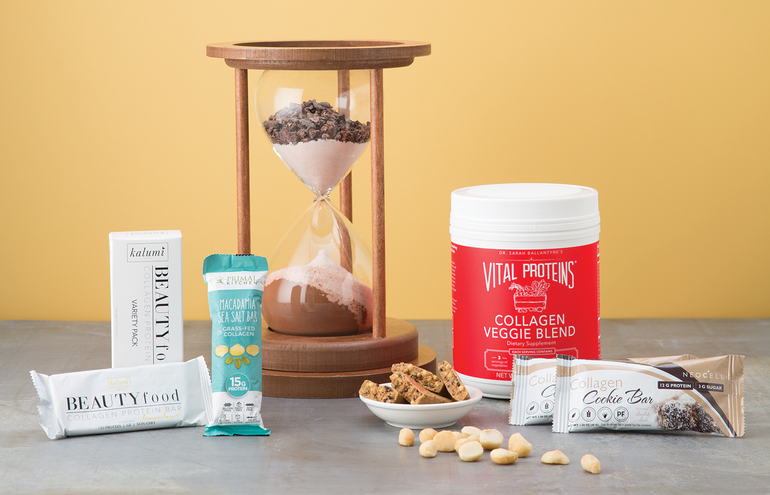
Kalumi BEAUTYfood Collagen Protein Bars
Formulated by two fashion models (really!), these collagen-based bars are sold in a variety three-pack, allowing users to decide which flavor is their favorite: Sweetie Pie, Lemon Love or Cocoa Kiss. Kalumi employs wholesome ingredients such as hydrolyzed marine collagen peptides, organic yacon syrup, cocoa butter, cashew butter and even sweet potato to add flavor and hair-nail-skin-strengthening functions. The bars are just starting to make their way into retail locations. SRP: $5.85
Primal Kitchen Macadamia Sea Salt Bar
Eight grams of grass-fed hydrolyzed collagen, pumpkin seeds and macadamia nuts allow this dairy-free and soy-free bar from Primal Kitchen to boast 15 grams of protein per 250-calorie bar. Coconut oil, coconut flakes and coconut flour add tropical flavor and good-fat bulk. Paleo-friendly sweeteners such as honey and monkfruit extract limit total sugar to just 3 grams per serving. And did we mention that it’s delicious? SRP: $2.99
NuttZo Bold BiteZ Peanut Pro
In this snack that’s so new we couldn’t get our hands on the final packaging, NuttZo blends eight nuts and seeds (peanuts, almonds, cashews, hazelnuts, brazil nuts, flaxseeds, sunflower seeds and chia seeds) with collagen into a novel 11-gram protein bar with just 14 grams of carbohydrates. What you won’t find? NuttZo doesn’t use soy, added sugar, palm oil or dairy, making it suitable for a wide range of special diets. SRP: $2.59-$2.99
Vital Proteins Collagen Veggie Blend
Yes, this protein powder is a little pricey, but even at about $5.30 per serving, it’s worth it. Dr. Sarah Ballantyne, aka “The Paleo Mom,” developed this beautiful blend containing 20 grams of collagen derived from beef per serving and a whole-food blend of 11 organic fruits and vegetables. Add two scoops to a smoothie or almond milk to streamline nutrition during busy schedules. SRP: $79
NeoCell Cookie Bar Coconut Chocolate Chunk
We’re thrilled that the collagen authority NeoCell recently branched into the food category. Each Certified Paleo Friendly bar contains 12 grams of protein—8.5 grams of which is derived from NeoCell’s signature grass-fed collagen. Each 230-calorie bar features nourishing organic almond butter, cassava root fiber, cacao, coconut nectar, sunflower oil, organic coconut, organic cocoa and more. It’s tasty, too. SRP: $2.99
'Natural flavor' backlash
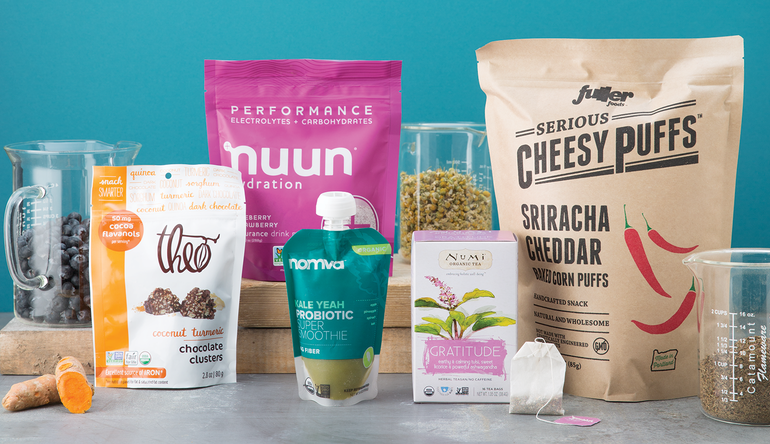
Theo Coconut Turmeric Chocolate Clusters
To coax out delightful flavor in these chocolatey bites, Theo spends ample time sourcing from USDA Organic, Fair for Life producers. The result is a high-quality sweet snack that doesn’t require adding natural flavoring to its cocoa beans, coconut, sorghum flakes, crisped quinoa, ground vanilla, ground turmeric and more. Bonus: Each serving contains 50 mg of heart-healthy cocoa flavanols. Try not to devour the whole bag in one sitting. SRP: $5.99
Nuun Hydration Performance Blueberry Strawberry Drink Mix
For its new Performance line of powdered drink mixes designed for endurance athletes, Nuun uses dried blueberry and dried strawberry to deliver fruity flavor while on the bike (or trail or treadmill) for longer than an hour. Also inside, you’ll find a Non-GMO Project Verified blend of perfectly proportioned electrolytes such as sodium citrate, potassium citrate, magnesium citrate and calcium citrate for hydration. SRP: $19.99
Nomva Kale Yeah Probiotic Super Smoothie
You won’t see any added flavors or hard-to-pronounce ingredients inside Nomva’s tasty, squeezable and surprisingly filling individual smoothie pack. Nomva protects the integrity of each USDA Organic ingredient blend by using high pressure processing (HPP) rather than heat pasteurization. Squeeze Kale Yeah directly into your mouth for a burst of apple, pineapple, spinach, kale and an added probiotic for digestive health support. SRP: $3.99
Numi Organic Tea Gratitude
Numi is committed to sourcing the best-quality ingredients for its new line of herbal “tisanes”—infusions of roots, spices, fruits, flowers and functional herbs. The Gratitude flavor features an Ayurvedic blend of tulsi (also called holy basil), lemon verbena, licorice, turmeric, chamomile, rose, nettle, ashwagandha, echinacea root, maca and more, making this product a rejuvenating—but caffeine-free—blend. SRP: $7.99
Fuller Foods Serious Cheesy Puffs Sriracha Cheddar Baked Corn Puffs
Founder Jack Kuo launched Fuller Foods because he was sick of eating puffed snacks that contained artificial ingredients, genetically engineered corn and fake flavors. Each crinkly puff is made with Bob’s Red Mill Corn grown in Oregon and California, real cheese from the Pacific Northwest and a blend of chilies, garlic, salt, organic sugar and mushroom for an umami taste. No natural flavors, maltodextrin or colorants in sight. SRP: $4.99
About the Author(s)
You May Also Like
.png?width=700&auto=webp&quality=80&disable=upscale)




